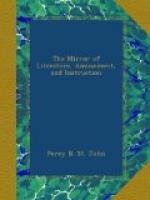’Tis yours, I know, to draw at will
Upon Futurity a bill,
And Plutus to importune:—
Discount the bill—take half
yourself
Give me the balance of the pelf.
And both may laugh at fortune.
Ibid.
* * * * *
GEORGE HARVEST.
The Rev. George Harvest, of Trinity College, Cambridge, having been private tutor to the Duke of Richmond, was invited to dine with the old duchess, and to accompany her party to the play. He used to travel with a night-cap in his pocket, and having occasion for a handkerchief at the theatre, made use of his cap for that purpose. In one of his reveries, however, it fell from the side-box, where he was sitting, into the pit, where a wag, who picked it up, hoisted it upon the end of a stick, that it might be claimed by its rightful proprietor. Judge of the consternation of a large party of ladies of rank and fashion, when George Harvest rose in the midst of them, and claimed the night-cap (which was somewhat greasy from use) by the initials G.H., which were legibly marked on it. The cap was restored to him amidst shouts of laughter, that ran through the pit to the great discomfiture of the duchess and the rest of the party.—Ibid.
* * * * *
SCIENTIFIC RECREATIONS.
* * * * *
ELECTRICAL PHENOMENA.
(From the Treatise on Electricity—in the Library of Useful Knowledge.)
The colours produced by the electric explosion of metals have been applied to impress letters or ornamental devices on silk and on paper. For this purpose Mr. Singer directs that the outline of the required figure should be first traced on thick drawing paper, and afterwards cut out in the manner of stencil plates. The drawing paper is then placed on the silk or paper intended to be marked; a leaf of gold is laid upon it, and a card over that; the whole is then placed in a press or under a weight, and a charge from a battery sent through the gold leaf. The stain is confined by the interposition of the drawing paper to the limit of the design, and in this way a profile, a flower, or any other outline figure may be very neatly impressed.
Most combustible bodies are capable of being inflamed by electricity, but more especially if it be made to strike against them in the form of a spark or shock obtained by an interrupted circuit, as by the interposition of a stratum of air. In this way may alcohol, ether, camphor, powdered resin, phosphorus, or gunpowder be set fire to. The inflammation of oil of turpentine will be promoted by strewing upon it fine particles of brass filings. If the spirit of wine be not highly rectified, it will generally be necessary previously to warm it, and the same precaution must be taken




